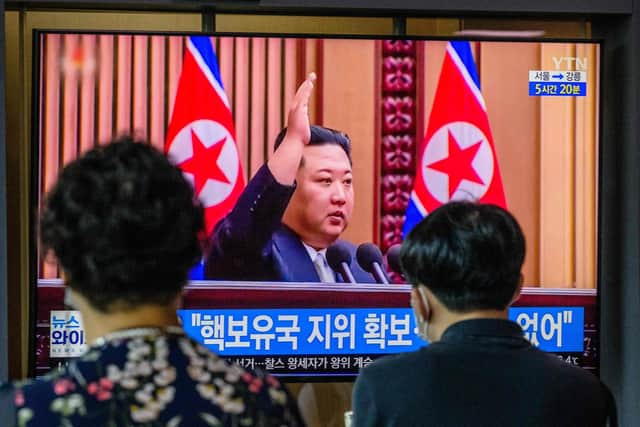North Korea's parliament rubberstamps legislation preventative nuclear strikes
Mr Kim made a speech in parliament, where members passed legislation governing the use of nuclear weapons, which he described as a step to cement the country's nuclear status and make clear such weapons would not be subject to bargaining.
The law spells out conditions where the North would be inclined to use its nuclear weapons, including when it determines that its leadership is facing an imminent "nuclear or non-nuclear attack by hostile forces".
Advertisement
Hide AdAdvertisement
Hide AdThe law requires North Korea's military to "automatically" execute nuclear strikes against enemy forces, including their "starting point of provocation and the command", if Pyongyang's leadership comes under attack.


The law also says North Korea could use nuclear weapons to prevent an unspecified "catastrophic crisis" to its government and people, a loose definition that experts say reflects an escalatory nuclear doctrine that could create greater concerns for neighbours.
In his speech, Mr Kim also criticised South Korea over its plans to expand its conventional strike capabilities and revive large-scale military exercises with the United States to counter the North's growing threats, describing them as a "dangerous" military action that raises tensions.
Mr Kim has made increasingly provocative threats of nuclear conflict towards the United States and its allies in Asia, also warning that the North would proactively use its nuclear weapons when threatened.
His latest comments underlined the growing animosity in the region as he accelerates the expansion of his nuclear weapons and missiles programme.
"The purpose of the United States is not only to remove our nuclear might itself, but eventually forcing us to surrender or weaken our rights to self-defence through giving up our nukes, so that they could collapse our government at any time," Mr Kim said in the speech published by the North's official Korean Central News Agency.
"Let them sanction us for 100 days, 1,000 days, 10 years or 100 years," Mr Kim said.
"We will never give up our rights to self-defence that preserves our country's existence and the safety of our people just to temporarily ease the difficulties we are experiencing now."
Advertisement
Hide AdAdvertisement
Hide AdMr Kim also addressed domestic issues, saying North Korea would begin its long-delayed rollout of Covid-19 vaccines in November.
He did not specify how many doses it would have, where they would come from, or how they would be administered across his population of 26 million people.
GAVI, the non-profit that runs the UN-backed Covax distribution program, said in June it understood North Korea had accepted an offer of vaccines from China.
The organisation said at the time the specifics of the offer were unclear.
North Korea rejected previous offers by Covax, likely because of international monitoring requirements, and has also ignored US and South Korean offers of vaccines and other Covid-19 aid.
Last month, Mr Kim declared victory over Covid-19 and ordered preventive measures eased just three months after his government for the first time acknowledged an outbreak. Experts believe the North's disclosures on its outbreak are manipulated to help Mr Kim maintain absolute control.
Comments
Want to join the conversation? Please or to comment on this article.